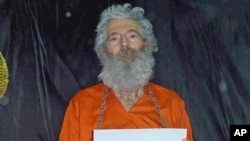As Americans celebrate the safe release of five prisoners from Iran, some members of the U.S. Jewish community are expressing outrage that Robert Levinson, who disappeared in Iran nine years ago, was left behind. Some have gone so far as to suggest that the Obama administration sacrificed Levinson in order to reach a nuclear agreement with Iran.
On Facebook, Jerusalem Post deputy managing editor Caroline Glick slammed the White House.
“In one day, President Obama screwed [did a disservice] to Israel, American Jewry and world Jewry...by abandoning FBI officer Robert Levinson in Iran, sealing his death warrant, and in so doing made clear that Jews are second class citizens and not worthy of the same protection as all other Americans,” she wrote.
Israeli political insider Josef Olmert, now adjunct professor at the University of South Carolina, said he shares her sense of betrayal.
“One Jew would never be allowed to in the way of the ‘historic’ agreement with Iran,” he blogged in the Times of Israel, calling on American Jewish groups who support the nuclear agreement “to look us in the collective white of our eyes and explain how come the administration, which they so support, allowed this outrage of abandoning one poor Jew to his fate.”
Olmert told VOA the fact the United States failed to secure Levinson’s release is viewed by many as a U.S. gesture to appease Iran.
“Moreover, it’s an indication, on top of others, of the resentment of the Obama administration towards Israel,” he said.
But Jeffrey Salkin, author and senior rabbi at Temple Solel in Hollywood, Florida, cautions against what he calls “an Obama-phobic narrative” in the wake of the Iran deal.
"There is no reason to believe that at all, and certainly I would not support whatsoever any narrative that the Obama administration threw him under the bus for his ethnicity or for any other reason,” Salkin said.
And most mainstream Jewish organizations, it would seem, agree.
“We hope that the regime will soon release American prisoner Robert Levinson, who has been held captive in Iran for nearly nine years and whose fate remains unknown,” read a statement released by the Anti-Defamation League Saturday, the day the five American prisoners were freed.
AIPAC and the American Jewish Committee issued statements acknowledging the nuclear deal’s implementation, but did not comment on the prisoner release.
Salkin said he believes that many members of the American Jewish establishment are uncomfortable criticizing the administration.
“Those who were in favor of the nuclear deal with Iran are looking for any possible sign that the deal is moving forward without delay,” noted Salkin. “Acknowledging that we still have a hostage or a prisoner or a missing person left behind puts the glitch in that narrative.”
Search Ongoing
Sunday, President Barack Obama said that Iran would “deepen its coordination” with the U.S. to locate Levinson.
Top U.S. negotiator Brett McGurk told PBS television this week he believes Levinson is being held outside Iran and will continue to press for his release.
Levinson, a former FBI agent, disappeared in March 2007 on Iran’s Kish Island. Initially, the U.S. State Department said he was working as a private investigator, probing cigarette smuggling. A later Associated Press report revealed Levinson had been on an unauthorized mission for the CIA to gather intelligence on Iran.
The last person to see him alive, an American fugitive wanted for the 1980 murder of an Iranian diplomat in Maryland, said Levinson was arrested by Iranian authorities.
Iran has denied knowing anything about his whereabouts.
Levinson’s family is calling for both Washington and Tehran to follow through on promises to locate him and are tweeting for his release, using the hashtag #Whataboutbob.
“There are people in the Iranian government who know where he is, and we believe there are people in the Iranian government who want to help bring my father home to us,” Levinson’s son Daniel, a financial analyst, told VOA’s Persian service. “This is a golden opportunity to show once more that our two countries can work together.





